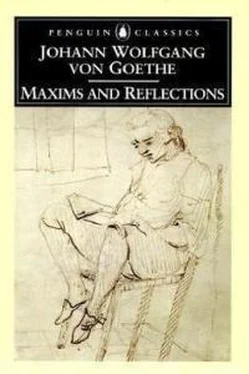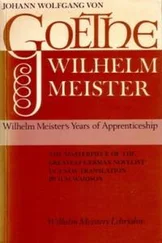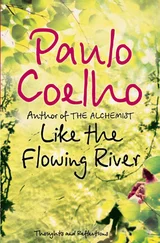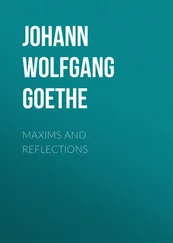Иоганн Гёте - Maxims and Reflections
Здесь есть возможность читать онлайн «Иоганн Гёте - Maxims and Reflections» весь текст электронной книги совершенно бесплатно (целиком полную версию без сокращений). В некоторых случаях можно слушать аудио, скачать через торрент в формате fb2 и присутствует краткое содержание. Год выпуска: 2015, Издательство: epubBooks Classics, Жанр: Публицистика, на английском языке. Описание произведения, (предисловие) а так же отзывы посетителей доступны на портале библиотеки ЛибКат.
- Название:Maxims and Reflections
- Автор:
- Издательство:epubBooks Classics
- Жанр:
- Год:2015
- ISBN:нет данных
- Рейтинг книги:5 / 5. Голосов: 1
-
Избранное:Добавить в избранное
- Отзывы:
-
Ваша оценка:
- 100
- 1
- 2
- 3
- 4
- 5
Maxims and Reflections: краткое содержание, описание и аннотация
Предлагаем к чтению аннотацию, описание, краткое содержание или предисловие (зависит от того, что написал сам автор книги «Maxims and Reflections»). Если вы не нашли необходимую информацию о книге — напишите в комментариях, мы постараемся отыскать её.
Maxims and Reflections — читать онлайн бесплатно полную книгу (весь текст) целиком
Ниже представлен текст книги, разбитый по страницам. Система сохранения места последней прочитанной страницы, позволяет с удобством читать онлайн бесплатно книгу «Maxims and Reflections», без необходимости каждый раз заново искать на чём Вы остановились. Поставьте закладку, и сможете в любой момент перейти на страницу, на которой закончили чтение.
Интервал:
Закладка:
It is, then, depth and truth and sanity of observation which chiefly mark these sayings of Goethe. It is no concern of his to dazzle the mind by the brilliance of his wit; nor does he labour to say things because they are striking, but only because they are true. He is always in contact with realities, always aiming at truth; and he takes a kindly and a generous view of the world. He has none of the despair that depresses, none of the malice that destroys. There are writers who profess to honour a lofty ideal by a cynical disparagement of everything that falls short of it; who unveil the selfish recesses of the heart as a mistaken stimulus to its virtues; who pay their tribute to great work by belittling human endeavour. Goethe shows us a more excellent way. Touched with a profound feeling of the worth of life, the wisdom of order, the nobility of effort, he gives us an ideal to pursue and shows us the means of pursuing it. Out of the fulness of a large experience, unique in the history of literature, he unfolds the scheme of a practicable perfection, and enforces the lessons he has learned from the steady, passionless, and undaunted observation of human affairs.
To Goethe these sayings were merely reflections or opinions ; it is his literary executors and his editors who called them by more ambitious titles, so as to challenge a comparison with certain other famous books of wise thought. They are the reflections of a long life rich in all the intellectual treasures of the world, in its versatility amazing, in its insight well–nigh fathomless; a life that, in his own words, approached the infinite by following the finite on every side. Such a man need only speak to utter something important; and we on our part need only remember how wide was the range of his knowledge, how full and complete his existence, to set the utmost value on his reflections at the end of it. But that he knew nothing of the pinch of poverty and was spared the horrors of disease, that he suffered no great misfortune, and basked in the bright side of the world, free from the ills that come to most men, there was no page of the book of life that was not thrown open to him. The things of the mind, the things of art, the things of nature—in their theory and in their practice he had worked at them all; regarding them as so many varied manifestations of an eternal Idea in itself inscrutable and here unattainable. There was no kind of literature with which he was unfamiliar, whether it was ancient or modern, of the East or of the West; and the great spiritual influences of the world, Hebraism, Hellenism, Christianity, Mediævalism,—at one or another time in his life he was in touch with them all, and found his account in them all. In matters of learning he was occupied with nothing but what was actual and concrete; it was only to abstract studies, to logic, metaphysics, mathematics, that he was indifferent; in his own phrase, he never thought about thinking. There was hardly any branch of the natural science of his day that he did not cultivate, that he did not himself practise; geology, mineralogy, botany, zoology, anatomy, meteorology, optics; and he made some remarkable discoveries and the strangest prophecies. To Art he gave a life–long devotion. While still a youth, he wrote an important essay on Gothic architecture; he engraved, drew, painted, and for a time took up sculpture. In all the higher forms of Art, with the single exception of music, he had so much practical interest that he often doubted whether in following Literature he had not mistaken, or at least unduly narrowed, the sphere of his activity. He was little abroad, but no one ever profited more by his travels than Goethe. Twice he went to Italy, and what a change of mind was produced by that change of sky! Rome was to him a new birth, a new conception of life. And besides Literature, Science, and Art, he busied himself with Administration, with the duties of the Court, with the practical details of the Theatre; but out of them all he learned something himself and taught something to others. He lived the fullest life granted to man. He had a youth of the wildest enthusiasm and romance; a prime of a classic austerity, of a calm earnestness; a majestic age of the ripest wisdom, when there came to him, as it were a second youth, with something of the fire of the old romantic feeling lighted up in him anew. And out of all these prodigious efforts in so many directions, he passed unharmed, and never lost himself. He steadily pursued his own task and refused to be drawn aside. He stood aloof from the controversies of his time. The battles of belief, philosophical systems, French Revolutions, Wars of Liberation, struggles of democracy and nationality,—these things moved him little or not at all. But he is not on that account to be held, as some foolish critics have held him, indifferent, selfish, or less serious, or less complete a man than his fellows. He did the best in any one's power: he resolutely kept to his own business, and, neither heating nor resting, worked at his own high aims, in the struggle not merely to learn and to know, but to act and to do. He felt profoundly that the best anyone can achieve for himself is often the best he can achieve for others. The whole moral of Wilhelm Meister is that a man's first and greatest duty, whether to others or to himself, is to see that his business in life is a worthy one and suited to his capacities. If he discovers his vocation and pursues it steadily, he will make his outer life of the greatest use and service to the world, and at the same time produce the utmost harmony within. That was what Goethe tried to do in his own person, and he laboured at his self–imposed task with a perseverance, a real unselfishness, and a determination entirely admirable.
It is almost the last fruit of this life of concentrated activity, the final outcome of this indomitable character, that is here put before us. And we shall find that to the complex phenomena of the world Goethe applied no other measure but reason and the nature and needs of man. With a full consciousness of the mysteries that surround our existence, he never made the futile endeavour to pass beyond the bounds of present knowledge and experience, or to resolve contradictions by manipulating the facts. In these detached reflections he does, indeed, propound a theory and sketch out a system of conduct; but they cannot, like the Thoughts of Pascal, for instance, be brought under a single and definite point of view. They are a mirror of life itself, and the inner and outer facts of life in all their diversity. The unity they possess is the unity that is stamped upon them by the all–embracing personality of their author, always and unweariedly striving to make his life systematic, distinct, and fruitful; and to judge them as a whole, a man must be able to fathom so great a genius. But to every one in every walk of life Goethe has a word of wise counsel, as though he understood every form of existence and could enter into its needs. In a fine passage in the Wanderjahre , he likens the thought that thus in wondrous fashion takes a thousand particular shapes, to a mass of quicksilver, which, as it falls, separates into innumerable globules, spreading out on all sides. And while these sayings may present thoughts in seeming contradiction one with another, as the moment that called them forth presented this or that side of experience, their inmost nature is a common tendency to realise a great ideal of life. It is little they owe to the form in which they are cast; they are not the elements of an artistic whole which must be seized before we can understand the full meaning of its parts. They are a miscellaneous record of the shrewdest observation; and to read them as they should be read, a few at a time, is like the opportunity of repeated converse with a man of extraordinary gifts, great insight, and the widest culture, who touches profoundly and suggestively now on this, now on that aspect of life and the world and the progress of knowledge. It is the fruit of his own experience that Goethe gives us; and we shall do well to think of it as he himself thought of another book, and to bear in mind that "every word which we take in a general sense and apply to ourselves, had, under certain circumstances of time and place, a peculiar, special and directly individual reference."
Читать дальшеИнтервал:
Закладка:
Похожие книги на «Maxims and Reflections»
Представляем Вашему вниманию похожие книги на «Maxims and Reflections» списком для выбора. Мы отобрали схожую по названию и смыслу литературу в надежде предоставить читателям больше вариантов отыскать новые, интересные, ещё непрочитанные произведения.
Обсуждение, отзывы о книге «Maxims and Reflections» и просто собственные мнения читателей. Оставьте ваши комментарии, напишите, что Вы думаете о произведении, его смысле или главных героях. Укажите что конкретно понравилось, а что нет, и почему Вы так считаете.








![Иоганн Гёте - Итальянское путешествие [litres]](/books/398657/iogann-gete-italyanskoe-puteshestvie-litres-thumb.webp)



